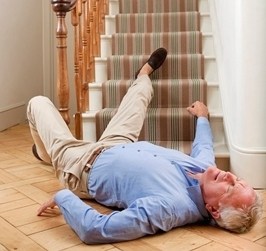Mobility, in many aspects, is similar to fresh air; we take it for granted and only see the value when it’s gone. The ability to stand up, move around, visit your favorite diner and climb stairs without pain or fear might seem mundane at first, but all it takes is an accident or an unexpected illness to see how important mobility really is.
Seniors will agree that a decrease in their walking capabilities has influenced their life for the worse. The elderly demographic is especially prone to falling, coupled with diseases such as osteoporosis or arthritis. And if limited movement wasn’t enough, the fear of falling again further affects their willingness to move about.

Family members often fail to realize the impact an injury can have on a senior’s life, since the loss of mobility has severe psychological consequences. The aging relative who was once previously self-sufficient is now unable to go shopping, visit friends and complete their own household tasks. They may even be forced to give up driving, which drastically limits their ability to get out and about.

To make matters worse, they must rely on others to get them places or do the grocery shopping. Since most elderly people pride themselves on their independence, they feel embarrassed to constantly ask for help, and would rather choose isolation. However, such a recluse lifestyle may lead to a decrease in hygiene, unhealthy diet and even depression. They might even go as far as sabotaging their chances of recovery by refusing any help offered.
It’s important to avoid letting an elderly relative become a shut-in because they might need therapy to regain mobility, and the success of this requires them to be in good physical and mental state. The main problem that a therapist faces is that seniors are so shocked after a fall that the fear of collapsing again paralyzes them. They refuse to perform exercises, even if they are supervised by professionals. The best thing a family member can do is convince their elderly relative of the usefulness of the therapy, and show undying support. They should be present during the exercises and encourage their loved one to push forward.

The best way to defeat the fear of falling is by slowly nurturing the confidence of the aging patient. If they are able to stand up, walk, and perform household chores without causing an accident then they will surely get their strength back. First of all, a senior suffering from mobility loss shouldn’t live alone in a cluttered house. Moving them to a nursing home will probably put even more stress on them, so instead consider hiring a caregiver while implementing anti-fall measures into the building, such as sticky bathroom rugs, shower benches, grab bars, and extra lighting in the hallway.
Lying helplessly on the ground, suffering from pain while unable to call for help is probably the most terrifying aspect of a fall. In case an aging relative is showing signs of nervousness when it comes to walking, the best course of action is to opt for a medical alert system that features fall detection pendants. These work similarly to the help buttons, but house several extra sensors and gyroscopes that constantly monitor the wearer’s position and movement.
When a fall is detected, the button sends an autonomous help signal, notifying the company’s monitoring agents. Since the operators have an extensive medical history on file for each customer, they will know the person is prone to falling and will send out the paramedics if no answer is given. In short, fall detection protects the wearer during an accident, but by merely wearing it the elderly can earn the necessary courage they need to start confidently walking again.

Share your thoughts, ask questions, and connect with other users. Your feedback helps our community make better decisions.
©2012-2025 Best Reviews, a clovio brand –
All rights
reserved